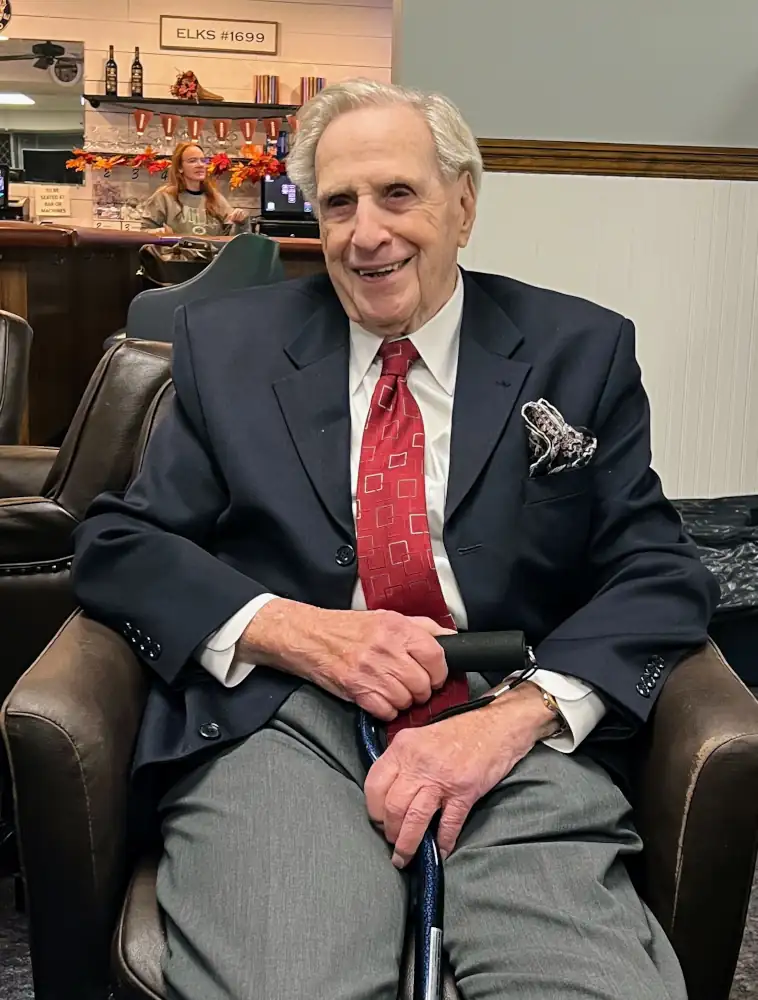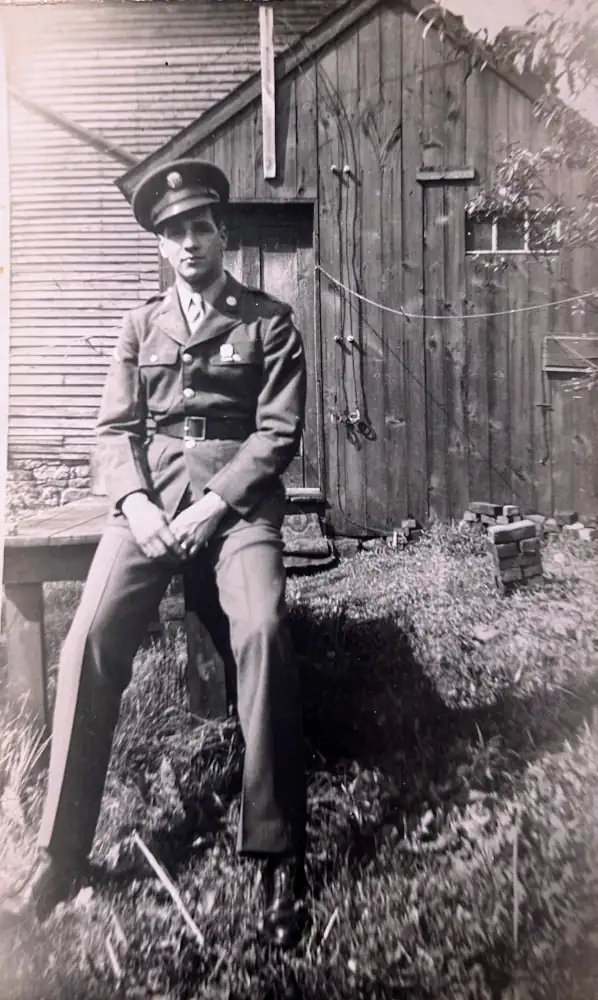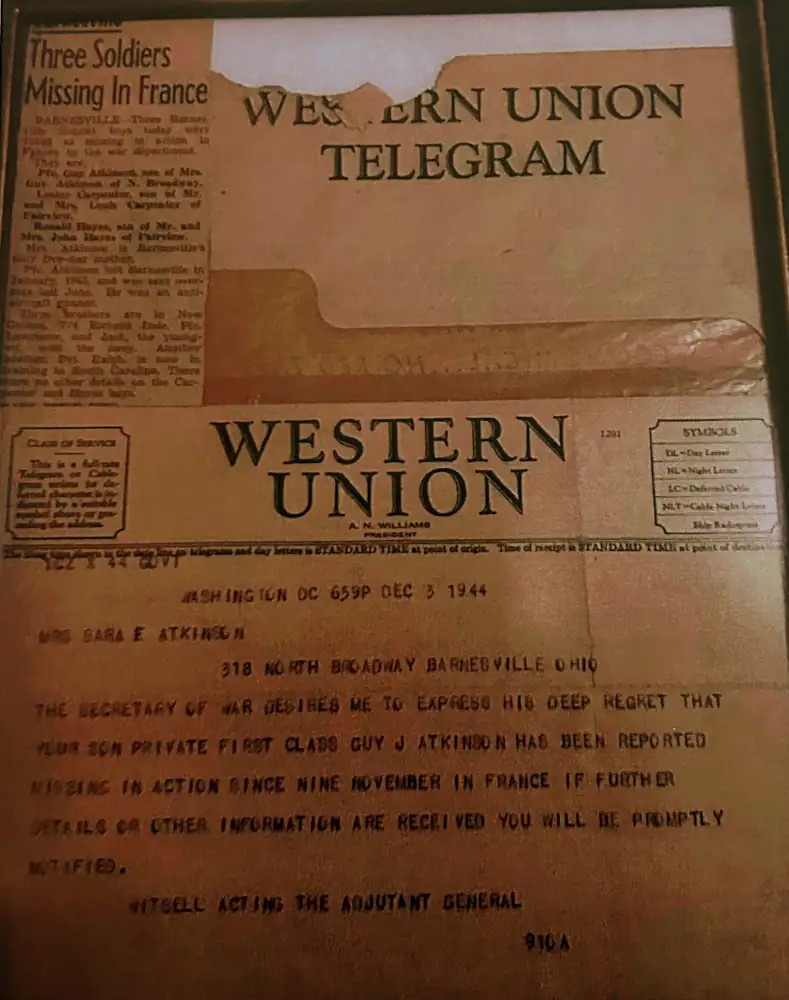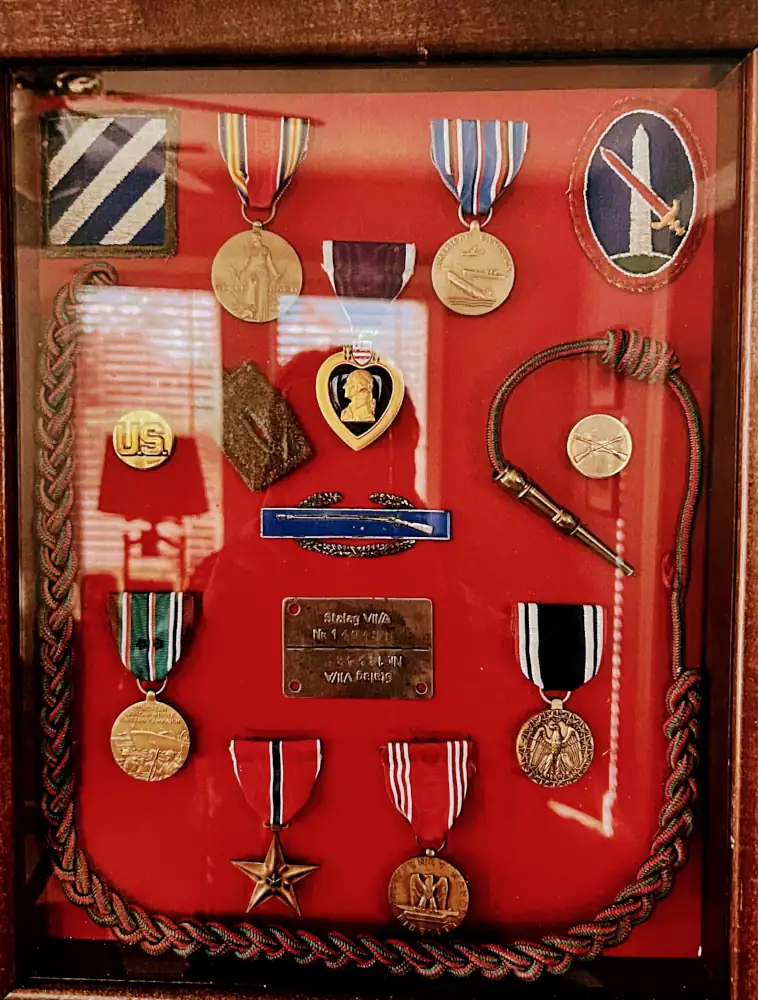World War II Veteran Guy Atkinson: Read and Remember His Story

Guy Junior Atkinson was born on March 16, 1923, in Barnesville, Ohio, to Guy and Sarah Atkinson. His father was a blacksmith. Guy was one of seven sons and one daughter. Atkinson was drafted into the U.S. Army on January 16, 1943, and served in World War II as an infantry rifleman.
After training in the United States, Atkinson went overseas to France and then to Italy in the fall of 1944. Atkinson stated, “When I was in Italy, I was afraid that the war was going to pass me by, so I volunteered for the infantry.” He continued, “I wanted to know what combat was like.” Atkinson saw his first action the day he joined the 3rd Infantry Division in France.

Getting Captured
Near St. Die, France, Guy and his platoon left their two-man foxholes to occupy a small village. The nine-man patrol ended up behind German lines, and they were discovered by the enemy. The group took refuge in a French farmhouse where they were surrounded by a larger force of Germans. Atkinson took up a position in front of the only window. “I got hit by machine gun fire in the left thigh,” said Atkinson. Five Americans, along with Guy, were wounded. Several Germans were also wounded and/or killed during the firefight.
The captured men were taken to Strasbourg. The men were transported in one of the Reich’s infamous boxcars, with about 80 other prisoners. There was not even room for all to sit at one time. The prisoners were given one slice of bread and a large communal can near the boxcar door for body waste, which quickly became full and spilled each time the train moved.
Atkinson’s leg became infected so he was placed in a P.O.W. hospital for 10 days. The hospital was staffed by British medical officers with very meager supplies. The hospital was unheated, but at least it was dry.
Imprisonment
After his release from the hospital, Atkinson was loaded again on a boxcar and taken to Stalag VII-A, Moosburg, Germany. Atkinson spent the rest of his captivity here. He was a P.O.W. for a total of 6 months.
“They worked us every day. I was never physically abused. The big thing was we had very little food, it was cold, and I had one shower in six months,” said Atkinson. The prisoners suffered with lice, fleas, starvation, and deprivation.
Guy Atkinson’s possessions during his imprisonment consisted of the following:
- Long Underwear
- Trousers, with the left leg off below the hip, pinned
- Wool Shirt
- Wool Knit Cap
- Field Jacket
- One Margarine Can, used for eating and drinking
- Toothbrush, no paste
- One Spoon
- One Blanket
- One Pair of Boots
The daily rations were meager: weak tea, watery soup, an eighth of a loaf of bread, and an occasional boiled potato. The Red Cross sent food parcels. When the parcels actually arrived, one parcel would be divided by as many as eight prisoners. Atkinson stated, “I feel that had it not been for the contents of those food parcels, a lot of us would not have survived the war.”

Liberation
In March 1945, Atkinson and the other prisoners heard the rumblings of artillery to the east. Each day, the sounds got louder. Allied troops were first seen on the morning of April 29. After a 30-minute firefight, a roar went up from the prisoners as a Sherman tank crashed through the main gate and into the compound. They were liberated by the 14th Armored Infantry Division.
Atkinson recalled, “The hatch popped open, and the tank commander came out. He looked around and spotted his own brother standing with a group of prisoners. What a reunion!”
The swastika came down and was replaced by the Stars and Stripes. Then a jeep pulled into the compound. General George S. Patton, wearing his ivory-handled pistols, stood up in the jeep and promised to get them out of the filth soon.
They were given food and medicine and remained in the camp for more than a week because there was no place to put them. By truck, plane, and ship, the prisoners made their way back to the United States. After a rough crossing on the USS Marine Dragon with twice the capacity of passengers, Atkinson and the others landed in Boston. The Red Cross wagon with doughnuts and real milk was the only greeting they received. “That was all the reception that I needed. I can still taste that snack,” stated Aktinson.

Guy Atkinson shared his thoughts about his service in the Army.
“I felt honored to have been able to serve my country when called, and I have no regrets for any hardships I was caused to endure. I did my duty as ordered. I advanced when told. I used my rifle for its intended purpose without any remorse. I am proud of all my medals and decorations and show them off when asked. I would serve again if asked.”
This story is comprised of excerpts from Guy Atkinson’s personal written accounts of his capture, imprisonment, and liberation. This author has the privilege to call Guy Atkinson Uncle. It is an honor to share his story so that what he and others endured is not forgotten. As part of the “Greatest Generation”, Guy does not see himself as a hero. He did what his country asked of him. But he is a hero to me. Love you, Uncle Guy.
Barnesville Area News Needs Your Support!
We're dedicated to providing coverage of the local happenings in Barnesville and the neighboring communities.
As a non-profit entity, we rely on the donations of readers like you.
Make a donation today and you'll be helping keep local news alive in the Barnesville area.

